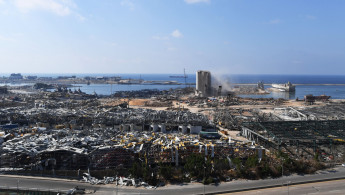Follow us on Facebook, Twitter and Instagram to stay connected
Lebanon sees 220 percent increase in Covid-19 cases since devastating Beirut blast
The blast left hundreds of thousands homeless in Beirut.
3 min read
Large parts of Beirut were destroyed in the blast [Getty]
Lebanon has seen a 220 percent increase in Covid-19 cases since 4 August when an explosion in Beirut damaged or destroyed large parts of the capital and made thousands homeless, the International Rescue Committee (IRC) has said.
A month later and Lebanon is seeing between 500 and 600 new coronavirus cases a day, a situation likely made worse by conditions brought about by the Beirut port blast.
"Since the day of the explosion one month ago we've seen over a 220 percent increase in the number of Covid cases in Lebanon, and it's showing no signs of slowing down," said Matias Meier, Country Director for the International Rescue Committee in Lebanon, in a statement.
"Almost everyday, 500 to 600 new cases are being confirmed and there are multiple clusters which is making it even harder to slow the spread. This is on top of everything else that people have to contend with."
The explosion was triggered by a fire at a storage facility which ignited a cargo of nitrogen oxide. The huge blast piled through homes and offices in Beirut and left an estimated 300,000 people homeless.
Meier said in the statement that 40,000 buildings, including 15,000 businesses, were damaged, something that is having a devastating impact on people's livelihoods.
|
|
"This means that for many people they lost both their home and their source of income in an instant. We are continuing to meet people every day who need support to get back on their feet," Meier added.
Although rebuilding homes has become the primary concern for most Beirut residents, the psychological impact on those who experienced the blast - said to be one of the biggest in history - is another concern for the IRC.
Children are among those most affected by post-blast trauma, while the coronavirus outbreak has also triggered fears they could still lose loved ones.
"In the areas worst affected by the blast our child protection team are meeting children who still cannot sleep at night because they are too scared. They are worried there is going to be another explosion. They're worried about losing relatives," said Meier.
Parents, who are struggling to find a means to support their families, are also coming to terms with the distressing event.
The IRC said it is working with local organisations to provide immediate cash support for families in Beirut and protection assistance, including psychological first aid.
It is prioritising efforts on children, families, and individuals in blast-hit areas of Beirut.
"Their families, too, are still trying to get their heads around the enormity of everything they've been through. Many of them need financial support, but they also need someone to talk to, to help them process what has happened," said Meier.
"Even though it is now four weeks since the explosion, we are still meeting new people every day who need support."





 Follow the Middle East's top stories in English at The New Arab on Google News
Follow the Middle East's top stories in English at The New Arab on Google News


